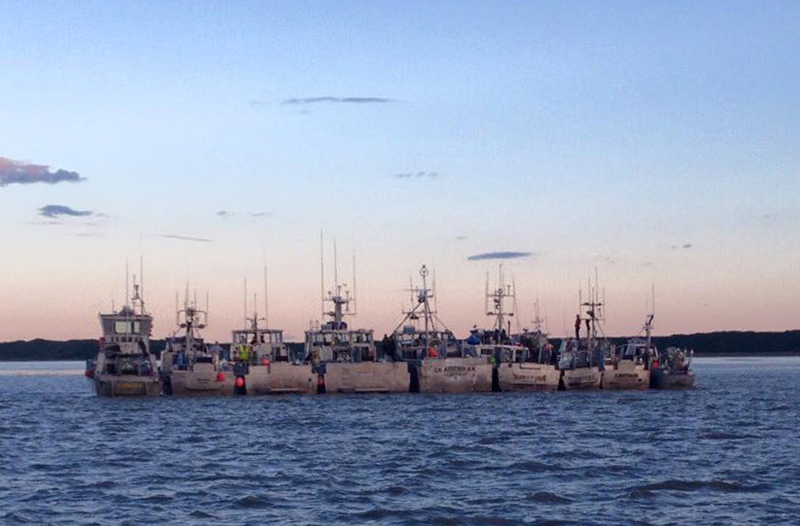I've been covering Pebble Mine for my entire career with National Fisherman — coming up on 14 years.
In that time, I've pretty consistently hammered home that it's foolhardy and short-sighted to trade one resource for another. The mine's long-term risks to biodiversity and healthy, sustainable salmon fisheries in Bristol Bay simply outweigh the short-term benefits offered by the extraction of the Pebble metals deposit. This is based entirely on what we know about mining — not just the process itself, but rather more importantly, the remnants a mine like this leaves behind in perpetuity.
I still believe this, but today I have something else to say.
When I watched Alannah Hurley give testimony about her people, their way of life and that Pebble Mine is a threat to all of it, I had to go one deeper than I have before.
I've seen the comments attempting to justify the mine: "Don't you like your car? Do you like having a smartphone? Then we need mines like this." It's true, we may need mines like this to sustain our lifestyles, but that doesn't mean we need THIS mine.
Then I listened to Hurley, executive director of the United Tribes of Bristol Bay, which I hope you will do, as well. I've included excerpts here, but I encourage anyone who has gotten this far to watch the entire hearing. Hurley's testimony begins at 40:37.
"We are salmon people. But salmon are more than food for us. Salmon are central to our cultural identity, our spirituality and our sacred way of life that has made us who we are for thousands of years in the Bristol Bay region.
"Pebble's proposal to build a mine at the heart of our watershed has been a dark cloud over Bristol Bay for the last 15 years...
"While our people have opposed Pebble for nearly two decades, our recent experience with the Army Corps of Engineers has made it clear to us the government is paving the way for Pebble regardless of the consequences…
"Why is the Army Corps rushing a time line that does not match up with any realities in Bristol Bay? Studies remain undone, data gaps remain unfilled, and the draft EIS has been universally condemned by the scientific community, by other federal agencies and by our people for its lack of thorough analysis of this project and its impact to the people of Bristol Bay…
"Why is it that Bristol Bay's First People, to whom this federal government owes a sacred trust responsibility, are continually treated as second-class citizens by agencies of the United States?
"We are not a box to be checked. We are not an obstacle to overcome, and we are not enemies to be defeated. We are the indigenous people of Bristol Bay. Our culture is not for sale…
"The Corps has made it clear that our people, science and fact do not matter in this process. So we plead with this committee to do everything in its power to hold this administration accountable."
I didn't fire off a news story or an editorial yesterday afternoon because I wanted to take some time to digest what I had heard over more than two hours of testimony, to let it sink in, to figure out if there was yet another way to look at this project.
Then I realized that if Hurley asked me to give up my car in order to let her people live their lives the way they choose, my answer would simply be, "Yes." If I could never buy another smartphone in exchange for the village elders to access fresh, clean water for the rest of their lives, then I'd say, "OK."
If our modern lifestyle still requires destroying other cultures, then maybe we're doing it wrong.
Culturally, we openly acknowledge the ills of colonialism. And yet we still hold fast to the notion that progress can come only in the form of a corporate check — our version of a king's grant. We cannot say that steamrolling other cultures in the name of progress is morally wrong and still say yes to this mine. The fishing industry was built and has been sustained by the purest American tradition of individuals thriving on their own skills and trade. How can we threaten to take that away from our own people to the benefit of a Canadian conglomerate?
It's still true that Pebble Mine has the potential to obliterate Bristol Bay's wild salmon runs for generations, which would destroy the commercial fishery there, along with about 14,000 jobs. That's reason enough to say no. But this is also an opportunity to reverse course on some of the worst moments of American history and make a thing right. Say no to short-term gain and yes to a choice that can make us all proud for generations to come.
National Fisherman will host a Keynote Panel on Pebble Mine at Pacific Marine Expo on Thursday, Nov. 21. Visit PacificMarineExpo to register.
Panelists include:
• Dr. Daniel Schindler, Alaska Salmon Program, University of Washington
• Andy Wink, Bristol Bay Regional Seafood Development Association
• Mike Friccero, Bristol Bay Regional Seafood Development Association
• Everette Anderson, Bristol Bay Native Corp.
• Renée Erickson, Seattle Chef and Owner of Sea Creatures Restaurants
• Moderated by Jessica Hathaway, National Fisherman







